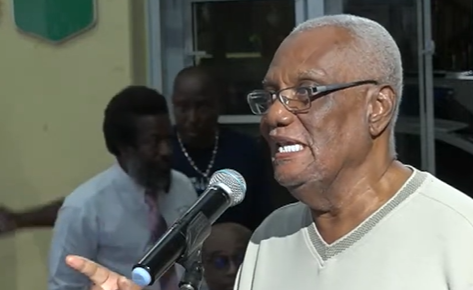Concerned that too many uneducated males seem to be falling through the cracks, veteran educator John Goddard has suggested that boys and girls be taught separately at the primary school level.
Acknowledging that his suggestion may be considered controversial, Goddard said if the Ministry of Education decides to execute his idea of teaching boys and girls separately during their primary school years, Barbados would see an improvement in the academic performance of males.
He stressed the need for the education system to do more for boys from an early age, saying that even though he believes boys and girls should be able to attend the same learning institution, “we can teach the boys and girls separately in the primary schools”.
Contributing to Public Consultations on the Proposals for Education Transformation which continued on Wednesday at the Princess Margaret Secondary School, Goddard, who previously taught at St George Secondary School, Harrison College and the Barbados Community College, said: “I think that if we teach the boys and girls separately for most of the subject areas at primary school, we will go a far way in helping our boys to improve their performance.”
He argued that boys have peculiar needs that may not necessarily be met when both sexes are taught together.
“Girls mature faster than boys. Boys must feel bad if every time results come out from a test in the classroom, they are at the bottom and the girls are at the top. It is not the girls’ fault. So, we need to spend some time dealing with boys. Otherwise, we are going to find difficulty coping with the wastage of human resources represented by uneducated males,” Goddard cautioned.
“And there are too many males in Barbados that are uneducated. Go to Dodds Prison; how many women do you see up there? A lot of our men are up there, and they cannot read and write.”
Goddard was adamant that education reform must begin at the primary school level.
In a recent letter to the editor addressing the issue of education reform, Goddard said he found it difficult to understand the reasoning behind announcing major plans for such a critical issue and then seeking to engage stakeholders in consultation, which he described as a clear case of putting the cart before the horse.
He penned that the political directorate through the Ministry of Education should have established a broad-based committee comprising relevant sectors of Barbadian society to produce recommendations for the transformation of the system, with key members being the Barbados Union of Teachers, Barbados Secondary Teachers’ Union, the associations of primary and secondary school principals, as well as the organisation representing university lecturers.
As he wrote in his letter, the retired educator told those who attended the public consultation meeting that there is no need for the proposed Junior and Senior Colleges of Excellence.
“I do not support the idea of Junior Colleges and Senior Colleges. Let me offer what I consider to be a reasonable alternative. I think that the ministry should identify three of the present schools that have the experience and success of teaching A levels and CAPE and identify them as sixth-form colleges. I would identify Harrison College, Queen’s College, and the Lodge School . . . because those three schools have been doing those areas for years,” he said.
Goddard added: “The other schools, retaining their names and all, can take students from the feeder schools. Now, once the Common Entrance Examination goes, the primary school teachers should then be required to concentrate their attention on all children, all ability levels. I support the idea of the diagnostic test on entry to the school, at age seven, and age nine for the purpose of remediation.
“Then, I support an assessment test at age 10 or 11, which would determine not where you go to school, but whether you are ready for secondary education because too many of the children right now are not ready.”




